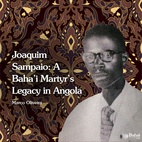The views expressed in our content reflect individual perspectives and do not represent the authoritative views of the Baha'i Faith.
Lately I’ve realized that exploring the Baha’i writings expands the way I experience time – and challenges me to develop a better sense of how my actions fit into the bigger picture of human history.
I now read about and take more interest in history, which I credit to the inspiration I get seeing how the writings of the central figures of the Baha’i Faith convey key spiritual lessons.
Those spiritual lessons often remind me of what the ancient Roman, Greek and other past civilizations faced in surviving. Moving forward to the issues and problems humanity now faces, I can apply these lessons from history to conceive of how we can overcome even greater global challenges.
Importantly, the Baha’i teachings connect together the religious prophets of the past into one immense and progressive sequence of spiritual and social purpose for humanity, stretching over vast periods of time. This “progressive revelation” theme has also fed my interest in time – thanks to articles here at BahaiTeachings.org, such as indications there have been innumerable prophets who enlightened societies around the world reaching well back before recorded human history.
RELATED: A Baha’i Prescription for Achieving Human Unity
My expanded perspective isn’t limited to the past, either. The twin prophets who founded the Baha’i Faith, Baha’u’llah and the Bab, have inspired my thinking about the future of divine guidance for humanity. They promised that more messengers will continue to come, well into the future. Baha’u’llah wrote:
… the Manifestations of His Divine glory and the Day Springs of eternal holiness have been sent down from time immemorial, and been commissioned to summon mankind to the one true God.
God hath raised up Prophets and revealed Books as numerous as the creatures of the world, and will continue to do so to everlasting.
This extended time horizon positions us all amidst a much longer journey, bridging a distant past to a distant future. It gives rise to hope and to a wonderful view of the future, which feels like a spiritual gift!
For example, this passage from Baha’u’llah’s writings predicts that the Baha’i teachings will have significant impact in alleviating humanity’s troubles: “Peerless is this Day, for it is as the eye to past ages and centuries, and as a light unto the darkness of the times.”
How An Expanded Time Horizon Can Change Our Thinking – and Our Actions
In my work I also feel an expanded sense of time emerging. People are now realizing, to a much greater degree than before, that large-scale problems require much time to tackle in order to solve them sustainably and equitably. Quick, short-term fixes, in other words, can create long-term problems.
For instance, one aspect I’m exploring – how governments can direct science to improve our food systems and renewable energy production – connects into new schools of thought from the 1990s onwards about a need for intergenerational justice and sustainability. These far-reaching concepts also expand our time horizons, by suggesting we consider the impacts of what previous generations did, and about what future generations might think of the decisions we make today.
Such ideas can lead scholars to suggest that policymakers must think within at least 200-year or even up to 500-year time horizons. These are seen as better suited to consider the profound impacts of some current actions, many of which are changing our planet’s climate and its long-term sustainability, rather than the short-term thinking that has gotten us into the predicaments we now face.
In a talk he gave to a Unitarian Conference in Boston in 1912, Abdu’l-Baha in fact pointed out that such “regenerated” thinking was unfolding in science and in the wider society. This was only 50 years after his father, Baha’u’llah, began his spiritual mission. Abdu’l-Baha saw these developments as essential in facing the new exigencies involving humanity’s world-scale problems:
The world of thought has been regenerated. … Present exigencies demand new methods of solution; world problems are without precedent. Old ideas and modes of thought are fast becoming obsolete. … Consider how the scientific developments of fifty years have surpassed and eclipsed the knowledge and achievements of all the former ages combined. Would the announcements and theories of ancient astronomers explain our present knowledge of the suns and planetary systems? Would the mask of obscurity which beclouded medieval centuries meet the demand for clear-eyed vision and understanding which characterizes the world today?
I originally took an education in physics and astronomy, where cosmic time and infinity were commonplace concepts in those research fields. Indeed, as Abdu’l-Baha said, much of what “ancient astronomers” had explained would be consigned to history books. Of course, this is evidence itself for the “regenerated thought” already underway in today’s science. In earlier times, scientists believed the Earth was only a few thousands years old, for example, and would have been happy with the shorter time horizons of those ancient astronomers.
RELATED: How to Harness the Vast Energy of Youth for Social Change
Back to the Future
Getting back to the future, how the worldwide Baha’i community is learning to work together for social justice and human progress has also challenged me to expand my time horizons, and my thinking about timescales to plan and act.
Compared to current political timescales and policy lifecycles, the Baha’i community plans ahead across far, far longer stretches of time than I ever previously thought possible. Consequently, I am coming to believe that expanded time horizons are indispensable, given the complexity and longevity of our challenge of advancing humanity’s prosperity collectively at a global scale.
Here the central figures of the Baha’i Faith outlined a specific vision of action and began to initiate plans to implement it over a comparatively long timescale. From its formation in 1963, the democratically-elected leadership body of the world’s Baha’is, The Universal House of Justice, began coordinating activities using a set of different yet overlapping timescales and time horizons, planning for the release of the society-building power of the Faith’s principles in terms of decades and even centuries. This itself strikes me as a truly remarkable, perhaps unprecedented time horizon, the most far-reaching plan of any elected governance institution operating in our present world.
This vision can stretch and challenge us. At the same time it is tangible enough to allow us to see how our own shorter-term efforts can cumulatively and collectively build to something greater.
Widen Our Vision: How Baha’is Think About Time
Overall, I hope these thoughts show how becoming a Baha’i has expanded the ways I think about time, how time features in the ways the worldwide Baha’i community works, and in how time is being tackled elsewhere in science and society.
So let’s return to the one challenge I mentioned at the start of this article – my need to develop possibly a more mature sense of my own place in time and history. One way I am trying to do this is by reflecting about time and how I use my time. I find the writings of Shoghi Effendi, the Guardian of the Baha’i Faith, particularly compassionate and encouraging as I try to do this. Shoghi Effendi wrote almost a century ago in 1930:
Ours is the duty to ponder these things in our heart, to strive to widen our vision, and to deepen our comprehension of this Cause, and to arise, resolutely and unreservedly, to play our part, however small, in this greatest drama of the world’s spiritual history.
Thanks to these inspiring words I often feel I somehow fit into a bigger picture. Thanks to these words I can also imagine this “drama of the world’s spiritual history” beginning long before my time here, and continuing long after. These insights help me reflect on my place and purpose. Hopefully – and all in good time – you and I together can build something greater than the fruit of just our own individual lives, and dedicate the small span of time we each spend on this Earth to its betterment.

















Comments
Sign in or create an account
Continue with Googleor